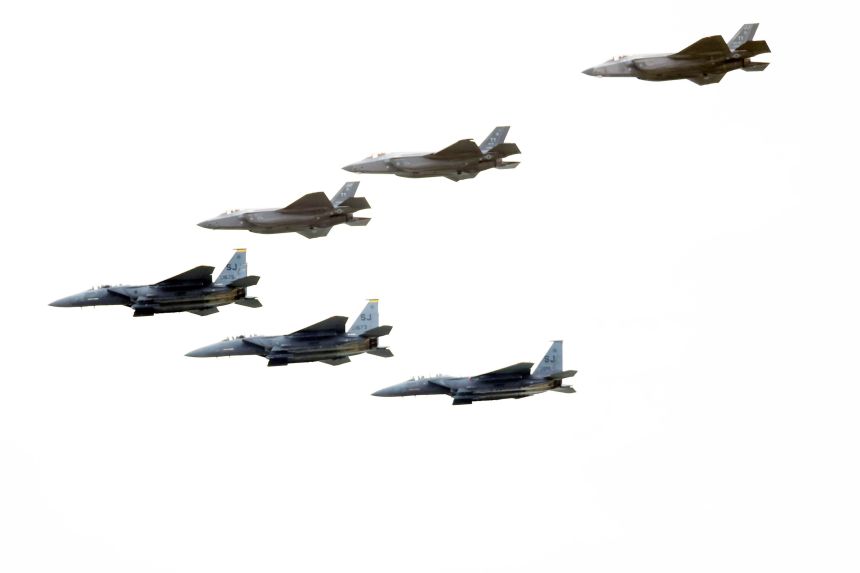The deal was supposed to reshape the Middle East.
Israel would normalize relations with Saudi Arabia, paving the way for ties with the wider Muslim world. In exchange, the Saudis would get a US security package that includes F-35 stealth fighter jets – fifth-generation aircraft that would cement Riyadh’s relationship with Washington as it opened a new chapter with Israel.
But, at least based on Trump’s public comments so far, only half of that package deal is likely to come to fruition. On Monday, President Donald Trump announced in the Oval Office that Saudi would be getting the fighter jets it has long coveted.
“We will be doing that. We will be selling F-35s,” Trump said as he called Saudi Arabia a “great ally.” Entirely missing from the statement was any mention of Israel.
The deal is likely to shift the balance of power in the region, strengthening Saudi Arabia as a Middle Eastern powerhouse and the first Arab nation to receive the most advanced American fighter jets. The sale still requires US government review and Congressional oversight, but the Trump administration can try to push those through over the next three years, potentially altering the military balance towards Riyadh, especially over any objections Israel may have.
Multiple Saudi sources told CNN that Riyadh was able to separate the two issues: the sale of F-35s didn’t require normalization with Israel, even though the Trump administration has said it remains a key foreign policy goal. While Trump has telegraphed the sale of the jets, he has not offered any specifics – including what, if any, assurances he had given to Israel.
Before the Gaza war, the Biden administration believed it was close to finalizing a normalization agreement between Israel and Saudi Arabia. But the war – along with Israeli Prime Minister Benjamin Netanyahu’s repeated rejection of a Palestinian state – derailed the deal. His far-right coalition partners prevented him from acknowledging the possibility of any form of Palestinian sovereignty, even far in the future and within Israeli security restrictions.
Instead of trying to force an issue that was stuck, Trump moved forward where he could. Saudi Arabia was willing to buy US weapons, and Trump was ready to sell, even without normalization.
“Trump made it clear he was delinking the two,” said Nawaf Obaid, a senior fellow at the Department of War Studies at King’s College. “He wasn’t going to waste his time on stopping all these weapons and items sales just because of Netanyahu.”
Riyadh has been the biggest buyer of US weapons for years, according to the Stockholm International Peace Research Institute. Obaid says the sale of F-35s was ultimately inevitable, a natural step in the defense relationship. Trump just dramatically accelerated the process.
The Saudis are not ruling out normalization in the future, but it will not be connected to the sale of F-35s. And it will certainly not happen now.
mpi34/MediaPunch/IPX/AP
“You need a new government (in Israel), and you need an irreversible path to a Palestinian state,” Obaid told CNN.
An Israeli security source said it was “very concerning” for the military that Riyadh would acquire fifth-generation fighter jets. “For many years, it was an unspoken role that we carefully ensured that no one in the Middle East arena will have the same aircraft and the same capabilities (as Israel),” the source told CNN, referring to the F-35s. “The severity is not exaggerated. It is not good (for Israel).”
In the final months of the first Trump administration, the US agreed to sell F-35s to the United Arab Emirates, a deal that would’ve made Saudi Arabia’s small neighbor the first Arab state to possess the fifth-generation fighters. In return, the UAE became the first Arab state in 26 years to normalize relations with Israel – which had signed off on the sale – handing Trump a major foreign policy win.
But the deal ultimately fell apart during the Biden administration over concerns about the burgeoning military cooperation between the UAE and China. The US was not going to risk allowing the technology behind its most advanced fighter jet to fall into Beijing’s hands, and the UAE was not willing to accept what one Emirati official said were American “sovereign operational restrictions” on their use.
Daniel Shapiro, the former US ambassador to Israel who took part in negotiations with the UAE, said the same concerns apply to Riyadh as well.
“It’s still unclear if Saudi Arabia will make those same commitments about limiting its military cooperation with China. In my judgment, it needs to in order for an F-35 program to be fully consistent with US security interests,” Shapiro told CNN.
Cinzia Bianco, Gulf research fellow at the European Council on Foreign Relations, said the UAE would be “pretty disappointed” about the Saudi F-35 deal but might try to “utilize the momentum” to ask Trump to reconsider the conditions set by the Biden administration for its own deal.
The US is also required by law to maintain Israel’s qualitative military edge (QME) over other countries in the region and determine whether any sale of advanced military equipment would erode that advantage. Shapiro cautions that Trump, in his rush to seal a major arms sale to a foreign partner flashing billions of dollars, may short circuit the review process, especially for Saudi Crown Prince Mohammed bin Salman.
“He has a closer affinity to Gulf countries than any previous president and arguably more so than his affinity for Israel,” Shapiro said.
Former Israeli military chief Gadi Eisenkot blasted the deal and the inability of Netanyahu, who repeatedly boasts about his relationship with Trump, to stop it from happening.
“Netanyahu has lost the ability to defend Israel’s national interests,” said Eisenkot, who was a lawmaker in the opposition before resigning earlier this year.
But Trump doesn’t view the sale as the major foreign policy move it represents, said Mark Cancian, a security and defense expert with the Center for Strategic and International Studies.
“Trump has always viewed arms sales as primarily an employment and manufacturing issue, not a foreign affairs issue,” Cancian told CNN. That makes him more open to weapons sales than his predecessors. Even so, Cancian calls it “surprising” that Trump would move forward with the sale without having Israel on board, “given that it would reduce Israel’s qualitative superiority over its neighbors.”
The US will still have leverage over Saudi weapons because of the significant American contractor support required to operate the systems. That may satisfy most US concerns over the use of advanced systems, including the F-35, Cancian said, but it likely won’t be enough for Israel, the country that has long been America’s closest ally in the Middle East.
The post Why Trump’s plan to sell F-35 jets to Saudi Arabia is so controversial appeared first on Egypt Independent.
























